The Fall Theater season is off and running and it’s all about the ills our generation is heir to. Here’s my take on two of the productions which have kicked off the season!
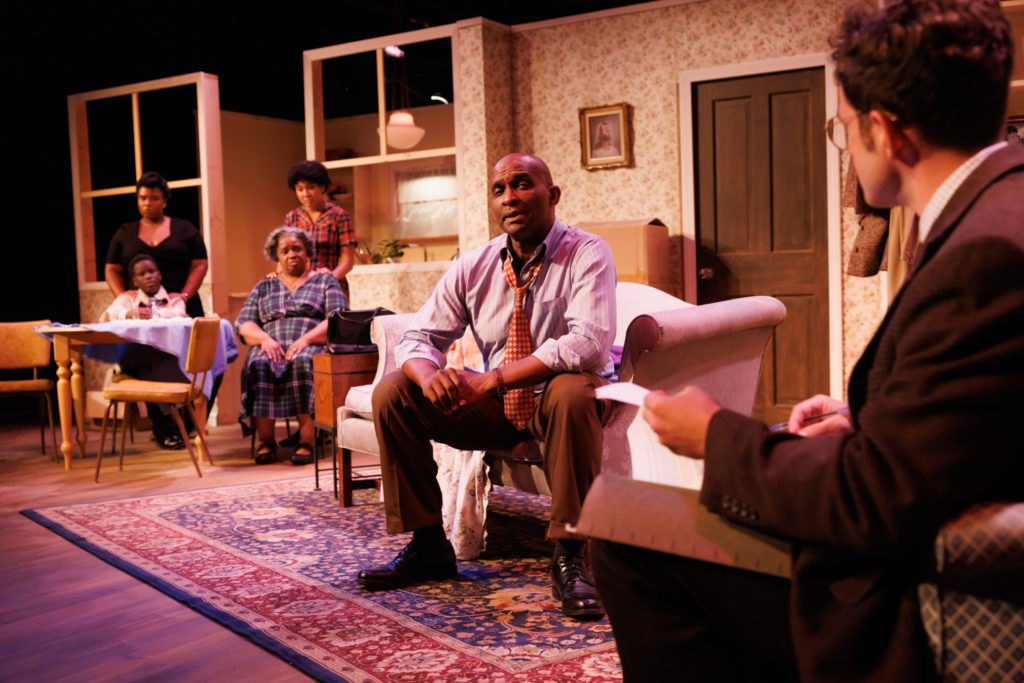
Lorraine Victoria Kanyike, Joshua Mckenna, Juanita A. Rodrigues, Valyn Lyric Turner, Damon Singletary, & Jon Vellante/Photo: Ken Yotsukura Photography
A RAISIN IN THE SUN is Lorraine Hansberry’s searing, indestructible classic about a black family living in cramped quarters in Chicago post WWII. This production by NEW REP THEATRE is perfectly set within the confines of the Mosesian Center’s Black Box, mirroring the Younger family’s cramped circumstances–physically, socially, and financially — as they bear the burden of racism. Ironically, the death of their patriarch has brought a windfall which promises liberation, and each member of the family harbors a dream which the insurance money can make tangible.
This production is sensitively directed by Lois Roach who elicits viscerally compelling performances from this cast as each character struggles to find a way out of the soul-crushing loop of economic hardship and systemic racial discrimination. Mama Younger (Juanita A. Rodgrigues) dreams of a big new house for her family. The actress anchors this production with her ease, warmth, and subtle gravitas. We feel her presence whether or not she is speaking or even in the scene. Her son Walter Lee (Damon Singletary) is itching to use the money to open a liquor store with his buddies; Singletary in a bravura performance rides the currents and undercurrents of the role, as it pitches between his impulsivity, ego, and his deeper insecurity about being the family provider. He craves validation as the head of the family and the climactic last scene will provide him that opportunity.
His wife Ruth (Lorraine Victoria Kanyike) has her hopes pinned on the the next generation of Youngers: her son Travis’s (Joshua McKenna) education, and her brilliant, ambitious daughter Beneatha (Valyn Lyric Turner) who dreams of being a doctor. Turner sparkles as Beneatha who can’t wait to make a break for it, and has no lack of suitors. They run the gamut from the rich, suave, and shallow George (Kadahj Bennett) whom Beneatha sees as a sell-out to the white oppressor, and the elegant Nigerian student Joseph Asagai (Joshua Olumide) who courts Beneatha with the siren song of Africa and a call to her ancestral roots. Olumide’s Asagai is the most charismatic presence on that stage.
The cast doesn’t quite coalesce into an ensemble until half way through the first act when the production really jelled. I forgot about Janie E. Howland’s disappointing set which didn’t feel lived-in or cluttered enough with the detritus of generations past. That Persian carpet on the living room floor looked new, as did the shelving and its contents. But this cast did fully inhabit and find its flesh and blood footing in Hansberry’s prescient play whose title is borrowed from a line in Langston Hughes poem HARLEM:
“What happens to a dream deferred?/Does it dry up /Like a raisin in the sun?”
It is sobering to realize the question still needs to be asked in 2023. But New Rep’s production crucially invokes dreams yet deferred, without quite dashing our hopes.
THROUGH October 1! Extra performances added to this almost sold out run:
Thursday, September 21st at 2pm
Tuesday, September 26th at 7pm
THE HALF GOD OF RAINFALL the season opener at the American Repertory Theater in Cambridge is a mythic tale of Greek Gods, Yoruba spirituality, misogyny, and basketball. Wait. What? The play by poet/playwright Inua Ellams is a co-production with New York Theatre Workshop and draws from a wide-ranging agenda of ideas and sources and is a feast for the eyes, but it has not found a structure sufficient to release the dramatic power of this bald epic tale of male rapacity and a woman’s revenge.
The trouble begins with a bet between two macho deities, Sango, the Yoruba God of Thunder and Zeus, his counterpart and King of the Greek gods (Jason Bowen and Michael Laurence). The prize is the beautiful mortal Nigerian woman Modupe (Jennifer Mogbock) and the result is her vicious rape. This is nothing new for the serial rapist Zeus; you’ll recall Leda, Europa, and Persephone among his many conquests.
The being born of this rape is the half-god Demi (Mister Fitzgerald) whose tears have the power to overflow rivers and wipe out whole towns. (Was he anywhere near Leominster last week?) He can also make it rain on the basketball court and this otherworldly prowess leads him from the NBA playoffs to–where else–the Olympics. We’re also given to understand that other familiar superstars, including Michael Jordan, have at least one foot in another sphere. But as Demi gains power, Zeus grows weak and jealous (for men it’s usually a zero sum game) making him vulnerable to the revenge of all victims of rape-culture, patriarchal privilege, and white supremacy who have felt the following, eloquently penned by Ellams:
“Modupe spoke of little happenings that beamed her back to the attack: a flash of light, a wild bird above would trigger it and she’d be a scream beneath Zeus again. His fists. Her throat. She asked why it happens? Keeps happening? What exact regime teaches males to take what isn’t given? What riles them?”
The scene of Modupe’s rape is profoundly disturbing. And Ellams poetry packs a punch, but the impact was not sustained by the elaborately stylized staging of this material and the muscular oratory of the players who stepped forward at the top of the show to introduce themselves and enact the tale. There are exquisite layers of stuff in which this story is wrapped–a stunning scenic design (Riccardo Hernandes), lighting (Stacey Derosier), sound design (Mikaal Sulaiman), exquisite projections (Tal Yarden), but none of it could substitute for the lack of focus on the narrative’s dramatic spine and may have short-circuited my visceral response. Ellams has a lot on his mind, but this ambitious incarnation of his work left me wanting. Taibi Magar directs this elaborate physical production, and I’ll never forget one sumptuous oceanic blue costume (Linda Cho) worn by Patrice Johnson Chevannes as Osun goddess of fertility and love; it flowed out over the entire stage but did not connect me to tale’s dramatic core. At the American Repertory Theater through September 24.

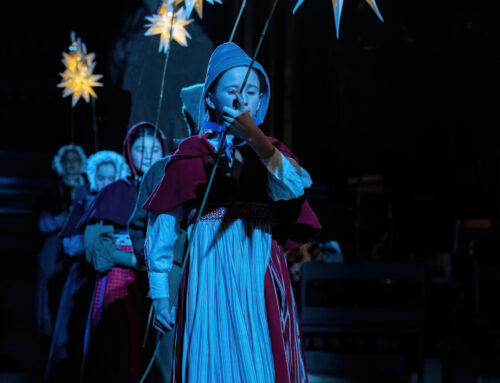
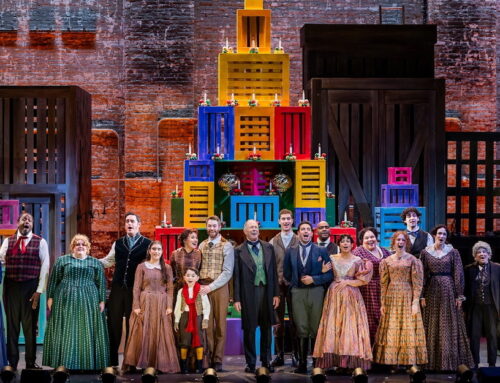
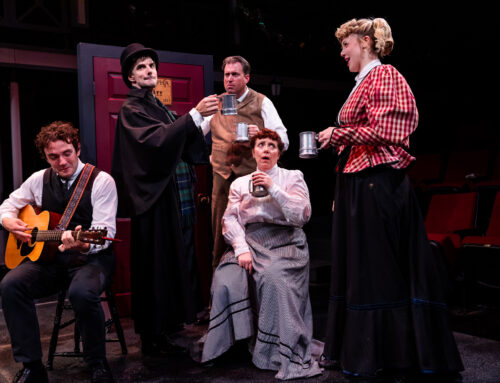
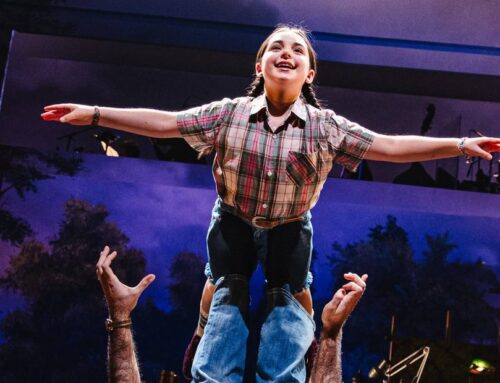
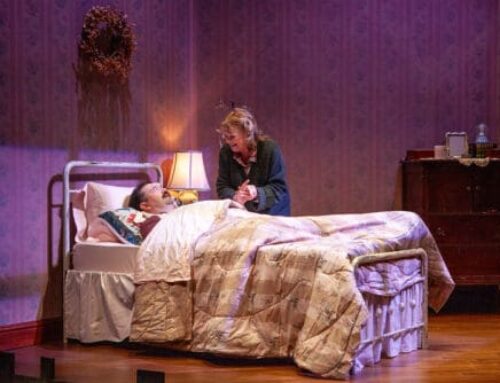
Leave A Comment
You must be logged in to post a comment.